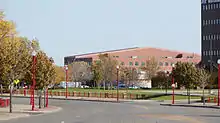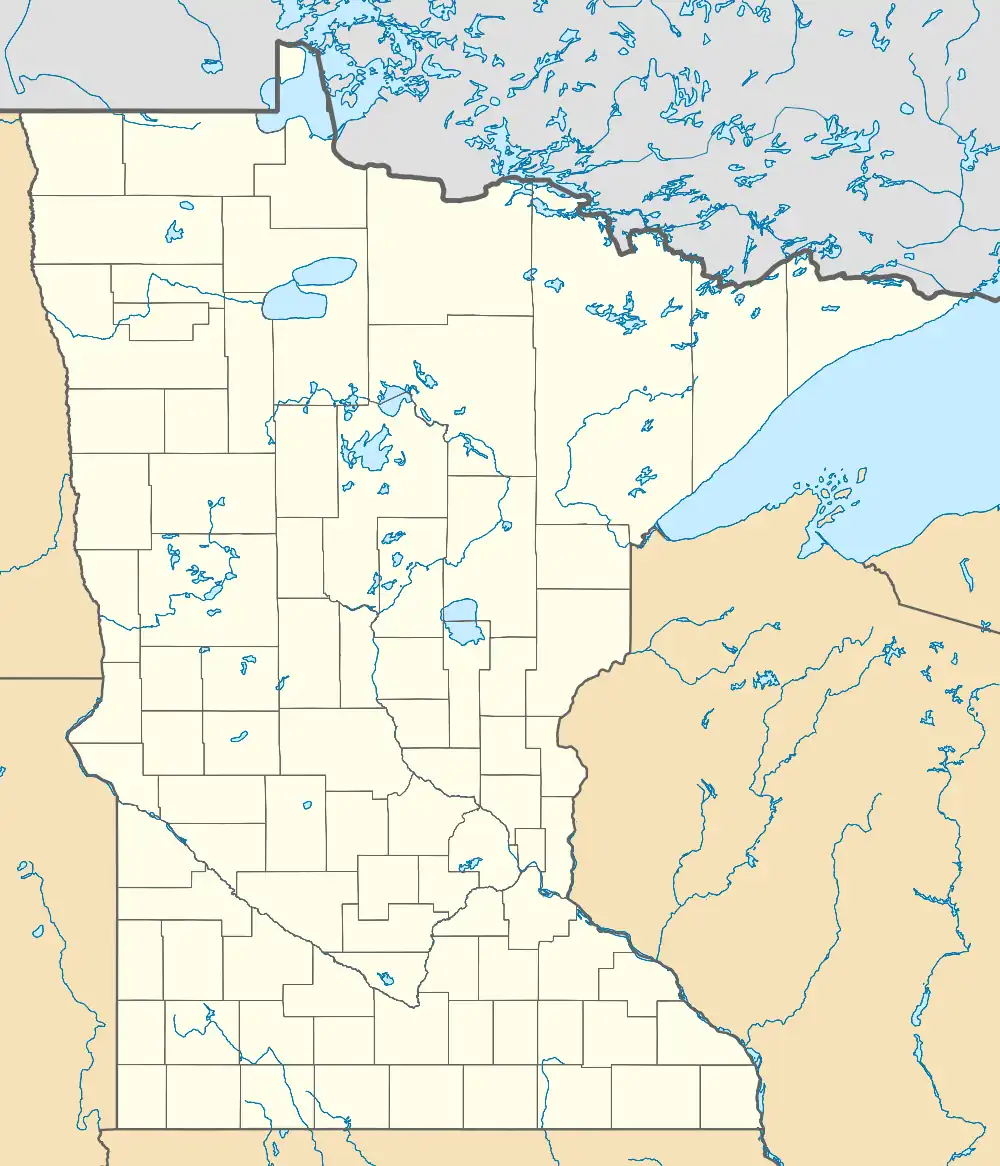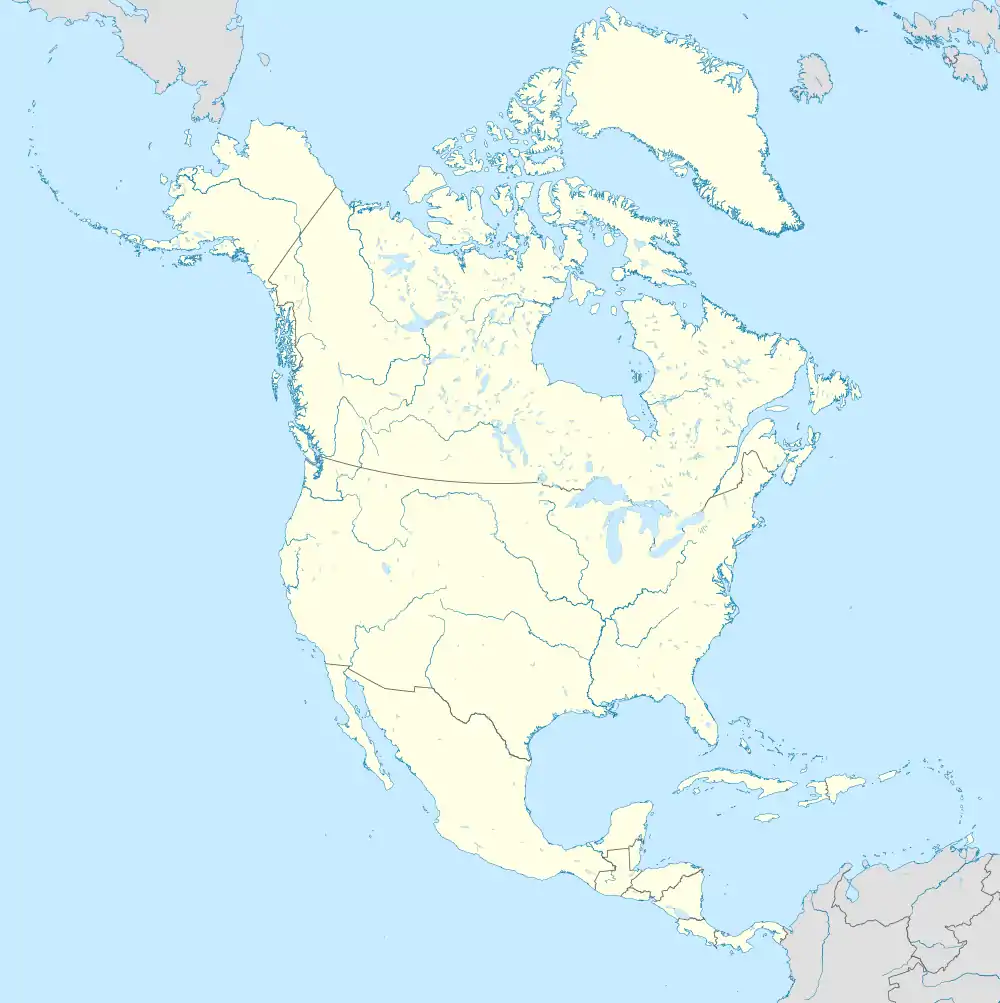Apple Valley | |
|---|---|
 Apple Valley during the autumn of 2006 | |
 Flag | |
| Motto(s): "Plant, Grow, Prosper"[1] | |
 Location of the city of Apple Valley within Dakota County, Minnesota | |
 Apple Valley  Apple Valley  Apple Valley | |
| Coordinates: 44°43′55″N 93°13′03″W / 44.73194°N 93.21750°W | |
| Country | United States |
| State | Minnesota |
| County | Dakota |
| Incorporated | 1969 |
| Government | |
| • Mayor | Clint Hooppaw |
| Area | |
| • City | 17.55 sq mi (45.45 km2) |
| • Land | 16.87 sq mi (43.69 km2) |
| • Water | 0.68 sq mi (1.76 km2) |
| Elevation | 955 ft (289 m) |
| Population | |
| • City | 56,374 |
| • Estimate (2022)[4] | 55,416 |
| • Rank | US: 724th MN: 17th |
| • Density | 3,341.47/sq mi (1,290.18/km2) |
| • Metro | 3,693,729 (US: 16th) |
| • Demonym | Valleyian |
| Time zone | UTC-6 (Central (CST)) |
| • Summer (DST) | UTC-5 (CDT) |
| ZIP code | 55124 |
| Area code | 952 |
| FIPS code | 27-01900 |
| GNIS feature ID | 0639415[5] |
| Website | ci.apple-valley.mn.us |
Apple Valley is a city in northwestern Dakota County in the State of Minnesota, and a suburb of the Twin Cities. The population was 56,374 at the 2020 census,[3] making it the 17th most populous city in Minnesota. In 2014, Money.com named Apple Valley the 17th best place to live in the United States, up from 20th in 2010, 24th in 2008 and 28th in 2007.[6]
History
The area that became Apple Valley was first established in 1859 as Lebanon Township, and remained a farming community for nearly a century. In the mid-1950s, residential developments started replacing farmland.[7] Orrin Thompson, a real estate developer, was responsible for the city's early development. He contracted a company to determine where the next growth in the Twin Cities would be. It was 0.5 miles (1 km) from County Road 42 and Cedar Avenue. Thompson bought the first houses and streets from the Brobacks, who built the city's first four houses. The firm that selected this area was in Apple Valley, California, so Thompson took that name for the development. An alternate explanation for the name change exists, however. According to local developer Henry Broback, Lebanon Township was renamed Apple Valley because "...when you drive east on (County Road) 42 and turn to enter Lebanon, it reminded them of Apple Valley, California, which was a nice community."[8][9]
Voters in the township voted to incorporate in the 1968 general election. They also selected the name Apple Valley over the name Lebanon Valley by a vote of 1376 to 757.[10]
Geography

According to the United States Census Bureau, the city has a total area of 17.57 square miles (45.51 km2), of which 16.86 square miles (43.67 km2) is land and 0.71 square miles (1.84 km2) is water.[11] The city's geography is rolling, with elevation from the lowest to the highest points in the city varying by one hundred feet (thirty metres) or more. The downtown area and its adjacent residential district (which formed the original core of the city when it was incorporated) are in a shallow valley.
Demographics
| Census | Pop. | Note | %± |
|---|---|---|---|
| 1860 | 160 | — | |
| 1870 | 216 | 35.0% | |
| 1880 | 252 | 16.7% | |
| 1890 | 242 | −4.0% | |
| 1900 | 286 | 18.2% | |
| 1910 | 292 | 2.1% | |
| 1920 | 361 | 23.6% | |
| 1930 | 380 | 5.3% | |
| 1940 | 364 | −4.2% | |
| 1950 | 377 | 3.6% | |
| 1960 | 585 | 55.2% | |
| 1970 | 8,502 | 1,353.3% | |
| 1980 | 21,818 | 156.6% | |
| 1990 | 34,598 | 58.6% | |
| 2000 | 45,527 | 31.6% | |
| 2010 | 49,084 | 7.8% | |
| 2020 | 56,374 | 14.9% | |
| 2022 (est.) | 55,416 | [4] | −1.7% |
| U.S. Decennial Census[12] 2020 Census[3] | |||
Apple Valley is in Minnesota's 2nd congressional district, represented by Angie Craig, a Democrat. Apple Valley is represented in the Minnesota Legislature by State Senator Greg Clausen (Democrat, District 57), Representative Robert Bierman (Democrat, District 57A), and Representative John Huot (Democrat, District 57B).
2010 census
As of the census of 2010, there were 49,084 people, 18,875 households, and 13,382 families living in the city. The population density was 2,911.3 inhabitants per square mile (1,124.1/km2). There were 19,600 housing units at an average density of 1,162.5 per square mile (448.8/km2). The racial makeup of the city was 83.8% White, 5.5% African American, 0.4% Native American, 5.3% Asian, 0.1% Pacific Islander, 2.0% from other races, and 3.0% from two or more races. Hispanic or Latino of any race were 4.9% of the population.
There were 18,875 households, of which 35.2% had children under the age of 18 living with them, 56.7% were married couples living together, 10.2% had a female householder with no husband present, 4.0% had a male householder with no wife present, and 29.1% were non-families. 23.6% of all households were made up of individuals, and 6.4% had someone living alone who was 65 years of age or older. The average household size was 2.58 and the average family size was 3.07.
The median age in the city was 37.9 years. 25.4% of residents were under the age of 18; 7.3% were between the ages of 18 and 24; 27.5% were from 25 to 44; 30.2% were from 45 to 64; and 9.6% were 65 years of age or older. The gender makeup of the city was 48.5% male and 51.5% female.
2000 census
As of the census of 2000, there were 45,527 people, 16,344 households, and 12,405 families living in the city. The population density was 2,625.5 inhabitants per square mile (1,013.7/km2). There were 16,536 housing units at an average density of 953.6 per square mile (368.2/km2). The racial makeup of the city was 91.81% White, 1.91% African American, 0.29% Native American, 3.39% Asian, 0.04% Pacific Islander, 0.88% from other races, and 1.69% from two or more races. Hispanic or Latino of any race were 2.00% of the population.
There were 16,344 households, out of which 42.5% had children under the age of 18 living with them, 63.7% were married couples living together, 9.0% had a female householder with no husband present, and 24.1% were non-families. 19.3% of all households were made up of individuals, and 4.0% had someone living alone who was 65 years of age or older. The average household size was 2.77 and the average family size was 3.21.
In the city, the population was spread out, with 29.7% under the age of 18, 7.2% from 18 to 24, 33.1% from 25 to 44, 24.4% from 45 to 64, and 5.5% who were 65 years of age or older. The median age was 34 years. For every 100 females, there were 95.6 males. For every 100 females age 18 and over, there were 92.4 males. For several years, the city's population was among the fastest growing in Minnesota, but it has virtually exhausted the amount of additional buildable land within city limits, and so its growth has slowed considerably since 1990.
The median income for a household in the city was $69,752, and the median income for a family was $79,335 (these figures had risen to $76,789 and $86,874 respectively as of a 2007 estimate). Males had a median income of $50,636 versus $33,315 for females. The per capita income for the city was $29,477. About 1.1% of families and 2.1% of the population were below the poverty line, including 2.0% of those under age 18 and 3.8% of those age 65 or over.
Politics
| Year | Republican | Democratic | Third parties |
|---|---|---|---|
| 2020 | 37.8% 12,772 | 59.7% 20,178 | 2.5% 824 |
| 2016 | 40.2% 11,924 | 50.6% 15,019 | 9.2% 2,718 |
| 2012 | 46.6% 13,798 | 51.4% 15,233 | 2.0% 593 |
| 2008 | 46.4% 13,560 | 51.9% 15,159 | 1.7% 491 |
| 2004 | 51.8% 14,994 | 47.2% 13,669 | 1.0% 275 |
| 2000 | 49.7% 12,387 | 44.7% 11,155 | 5.6% 1,389 |
| 1996 | 40.8% 8,255 | 48.4% 9,805 | 10.8% 2,182 |
| 1992 | 37.1% 7,488 | 36.5% 7,360 | 26.4% 5,344 |
| 1988 | 57.4% 8,875 | 42.6% 6,580 | 0.0% 0 |
| 1984 | 62.0% 7,550 | 38.0% 4,622 | 0.0% 0 |
| 1980 | 49.9% 5,104 | 38.0% 3,890 | 12.1% 1,245 |
| 1976 | 52.9% 3,913 | 44.9% 3,321 | 2.2% 157 |
Economy
Top employers
According to Apple Valley's 2016 Comprehensive Annual Financial Report,[28] the top employers in the city are:
| # | Employer | # of Employees |
|---|---|---|
| 1 | Independent School District 196 | 1,414 |
| 2 | Target Corporation | 520 |
| 3 | Uponor | 400 |
| 4 | Dakota County | 384 |
| 5 | Walmart | 350 |
| 6 | Augustana Care | 265 |
| 7 | Menards | 250 |
| 8 | Wings Financial Federal Credit Union | 225 |
| 9 | Minnesota Zoo | 220 |
| 10 | Apple Valley Medical Clinic | 200 |
Arts and culture
Annual cultural events
Apple Valley hosts an annual July 4 festival called "Apple Valley Freedom Days"[29] Festivities include one of the area's largest parades that features local marching bands, service organizations, and many local businesses. There is also a carnival and a fireworks display during the event.
In February, the city hosts the Apple Valley Winter Carnival. Events include ice skating, a medallion hunt, contests and children events.
The Minnesota Zoo
Apple Valley is home to the Minnesota Zoo, a nationally recognized zoological garden that houses hundreds of animals from several distinct climatological zones. Collections include an indoor Tropics Trail featuring animals from the worlds rain forests and tropical habitats, the Minnesota Trail with native animals from Minnesota including black bears, wolves, wolverines and beaver pond. The Northern Trail features large animals from the worlds cold climates. Highlights of this trail are musk ox, Asian wild horses, Takins from China and animals from remote east coast including brown bears, amur leopards, and wild boars. The zoo also features an aquarium, an exhibit of penguins from South Africa and the popular Japanese snow monkeys,[30]
Education
There are six elementary, three middle and three high schools in the city, all operated by Independent School District 196. In addition to the two comprehensive high schools, Apple Valley is home to a magnet school open to 11th and 12th graders, the School of Environmental Studies. In fall 2007, Independent School District 196 opened three elementary-level magnet schools: Cedar Park Elementary, which will become a Science, Technology, Engineering and Math (STEM) magnet; Diamond Path Elementary, which will have an International Studies theme, and Glacier Hills Elementary, with an Arts and Science theme.[31] In 2017, Independent School District 196 opened a new Elementary school in neighboring Lakeville, Minnesota.[32] Some students attend public schools in other school districts chosen by their families under Minnesota's open enrollment statute.[33]
Infrastructure
Transportation
Interstate Highway 35E, Cedar Avenue, and County Road 42 are three of the main routes in Apple Valley. Highway 77 briefly enters the northern part of Apple Valley and becomes County Road 23 / Cedar Avenue.
Minnesota Valley Transit Authority operates many weekday commuter buses to and from Downtown Minneapolis and Saint Paul. The recently built Red Line operates as a dedicated bus line with service to and from the Mall of America.
Notable people
- Brianna Brown, actor, Days of Our Lives, Devious Maids
- David Fischer, former American ice hockey defenseman for the Montreal Canadiens[34]
- Mark Hall, folkstyle and freestyle wrestler, NCAA Wrestling Champion, attended Apple Valley High School
- John Harvatine IV, Co-owner of Stoopid Buddy Stoodios and creator of the tv show Crossing Swords.
- Erik Jensen, American actor, playwright, screenwriter and director
- Tyus Jones, Point guard for the NBA Memphis Grizzlies. Won the 2015 NCAA Basketball championship with the Duke Blue Devils, and was on the cover for the Sports Illustrated issue celebrating the championship.[35]
- Tre Jones, point guard for the San Antonio Spurs.[36] Tyus' younger brother.
- Vincent Kartheiser, actor, attended Apple Valley High School prior to beginning his career. Had roles in shows such Mad Men and Angel, and films like Alaska, Another Day in Paradise and many others.
- Carolyn Jane Rodriguez, Minnesota legislator[37]
- Coleen Rowley, former FBI agent and 9/11 whistleblower who was named Time magazine's "Person of the Year" in 2002
- Nicholas Sadler, actor who has appeared in the films Scent of a Woman, Disclosure, Mobsters, as well as the TV shows The Cosby Show and ER
- Dan Sexton, former ice hockey forward for the Anaheim Ducks
- Gable Steveson, Olympic gold medalist in freestyle wrestling (2020 Tokyo)
- Maria Thayer, actress who has appeared in sitcoms Strangers with Candy and Will & Grace, as well as in the films Hitch and Accepted
- Gary Trent Jr., Shooting guard for the Toronto Raptors NBA team
- Lindsey Vonn (née Kildow), Olympic skier[38]
- Darril Wegscheid, Minnesota state senator
References
- ↑ "City of Apple Valley Minnesota". City of Apple Valley Minnesota. Retrieved October 16, 2012.
- ↑ "2020 U.S. Gazetteer Files". United States Census Bureau. Retrieved July 24, 2022.
- 1 2 3 "Explore Census Data". United States Census Bureau. Retrieved October 5, 2023.
- 1 2 "City and Town Population Totals: 2020-2022". United States Census Bureau. October 5, 2023. Retrieved October 5, 2023.
- ↑ "US Board on Geographic Names". United States Geological Survey. October 25, 2007. Retrieved January 31, 2008.
- ↑ "Money.com's Best Places to Live 2014". Money.com. May 30, 2014. Archived from the original on May 6, 2021. Retrieved November 2, 2013.
- ↑ "City of Apple Valley". City of Apple Valley. Retrieved May 27, 2019.
- ↑ "The Transformation of a Dakota Community Lebanon Township to Apple Valley An Agrarian Township Becomes a Residential Success" (PDF). Over the Years. 30 (1): 25. December 1990. Archived from the original (PDF) on October 6, 2007. Retrieved January 27, 2007.
- ↑ "Profile for Apple Valley, Minnesota, MN". ePodunk. Retrieved October 16, 2012.
- ↑ "Vote Makes Apple Valley New Village". Minneapolis Star. November 6, 1968. Retrieved May 27, 2019.
- ↑ "US Gazetteer files 2010". United States Census Bureau. Archived from the original on January 12, 2012. Retrieved November 13, 2012.
- ↑ United States Census Bureau. "Census of Population and Housing". Retrieved August 12, 2021.
- ↑ "Minnesota Secretary Of State - 2020 Precinct Results Spreadsheet". www.sos.state.mn.us. Retrieved August 29, 2023.
- ↑ "Minnesota Secretary Of State - 2016 Precinct Results Spreadsheet". www.sos.state.mn.us. Retrieved August 29, 2023.
- ↑ "Minnesota Secretary Of State - 2012 Precinct Results Spreadsheet". www.sos.state.mn.us. Retrieved August 29, 2023.
- ↑ "Minnesota Secretary Of State - 2008 Precinct Results Spreadsheet". www.sos.state.mn.us. Retrieved August 29, 2023.
- ↑ "Minnesota Secretary Of State - 2004 Precinct Results Spreadsheet". www.sos.state.mn.us. Retrieved August 29, 2023.
- ↑ "Minnesota Secretary Of State - 2000 Precinct Results Spreadsheet". www.sos.state.mn.us. Retrieved August 29, 2023.
- ↑ "Minnesota Secretary Of State - 1996 Precinct Results" (PDF). Archived (PDF) from the original on April 10, 2021.
- ↑ "Minnesota Secretary Of State - 1992 Precinct Results" (PDF). Archived (PDF) from the original on April 10, 2021.
- ↑ "Minnesota Secretary Of State - 1988 Precinct Results" (PDF). Archived (PDF) from the original on April 10, 2021.
- ↑ "Minnesota Secretary Of State - 1984 Precinct Results" (PDF). Archived (PDF) from the original on April 10, 2021.
- ↑ "Minnesota Secretary Of State - 1980 Precinct Results" (PDF). Archived (PDF) from the original on April 10, 2021.
- ↑ "Minnesota Secretary Of State - 1976 Precinct Results" (PDF). Archived (PDF) from the original on April 10, 2021.
- ↑ "Minnesota Secretary Of State - 1968 Precinct Results" (PDF). Archived (PDF) from the original on April 10, 2021.
- ↑ "Minnesota Secretary Of State - 1964 Precinct Results" (PDF). lrl.mn.gov.
- ↑ "Minnesota Secretary Of State - 1960 Precinct Results" (PDF). Archived (PDF) from the original on April 10, 2021.
- ↑ City of Apple Valley 2016 CAFR
- ↑ "Apple Valley Freedom Days – Celebrating 57 Years". Retrieved August 29, 2023.
- ↑ "Minnesota Zoo". mnzoo. Archived from the original on September 9, 2007. Retrieved September 6, 2007.
- ↑ "Independent School District 196". ISD 196. Archived from the original on September 28, 2007. Retrieved September 6, 2007.
- ↑ "East Lake Elementary". sites.google.com. Retrieved April 23, 2020.
- ↑ "Open Enrollment". Minnesota Department of Education. Archived from the original on August 26, 2010. Retrieved November 19, 2010.
- ↑ "David Fischer". Hockey's Future. Retrieved October 14, 2012.
- ↑ Finklestein, Adam (November 15, 2013). "Duke Lands Jahil Okafor, Tyus Jones". ESPN. Retrieved April 18, 2015.
- ↑ "2020 Draft Prospect | Tre Jones". NBA.com.
- ↑ 'Carolyn Jane Deshon Rodriguez (obituary), St. Paul Pioneer, March 10, 2002
- ↑ Tribune, Rachel Blount Star. "Lindsey Vonn: On top of the world". Star Tribune. Retrieved November 9, 2022.
External links
- Apple Valley Chamber of Commerce website
- Apple Valley official city government website
- History of Apple Valley
- ePodunk: Profile for Apple Valley, Minnesota
